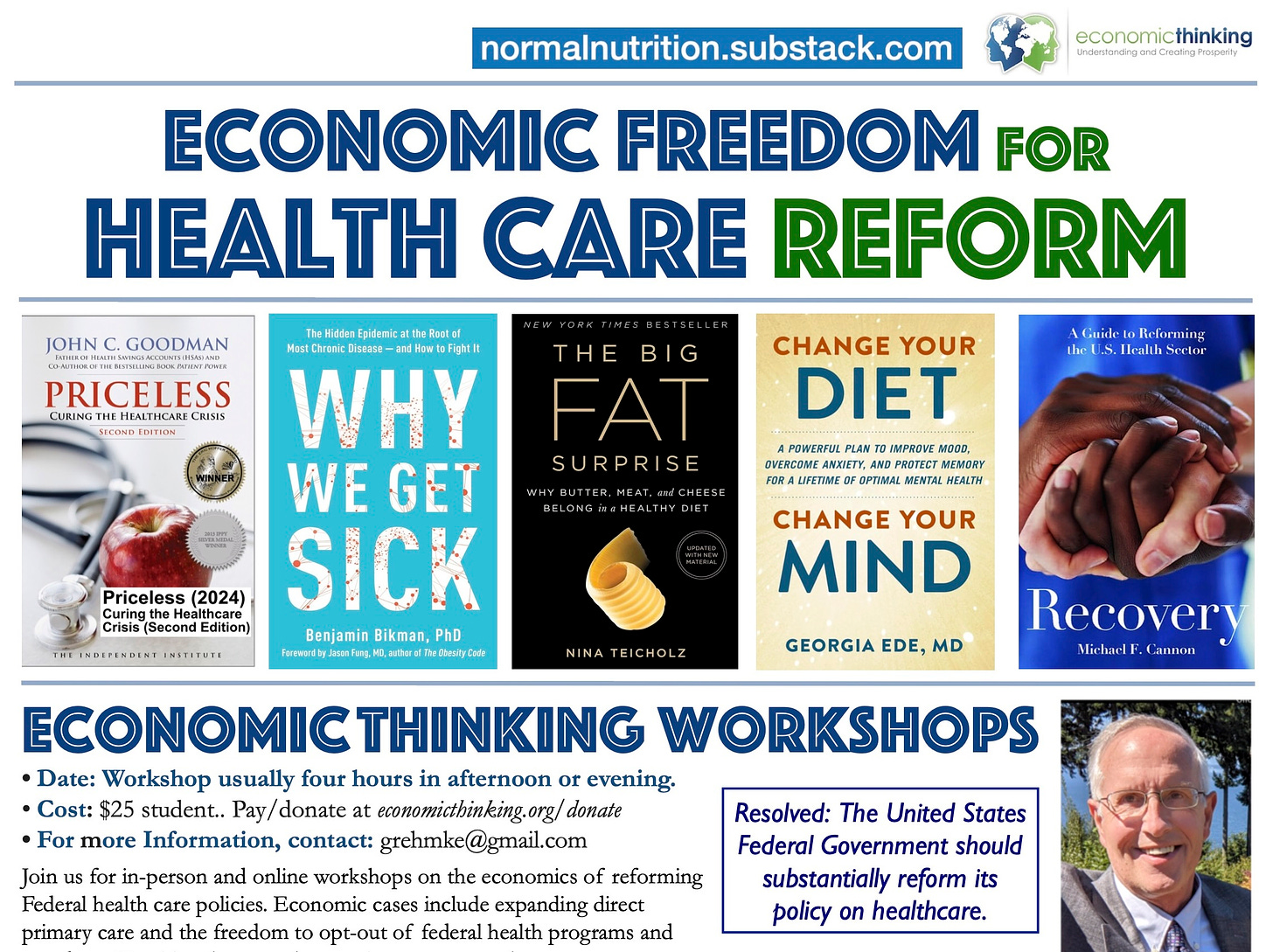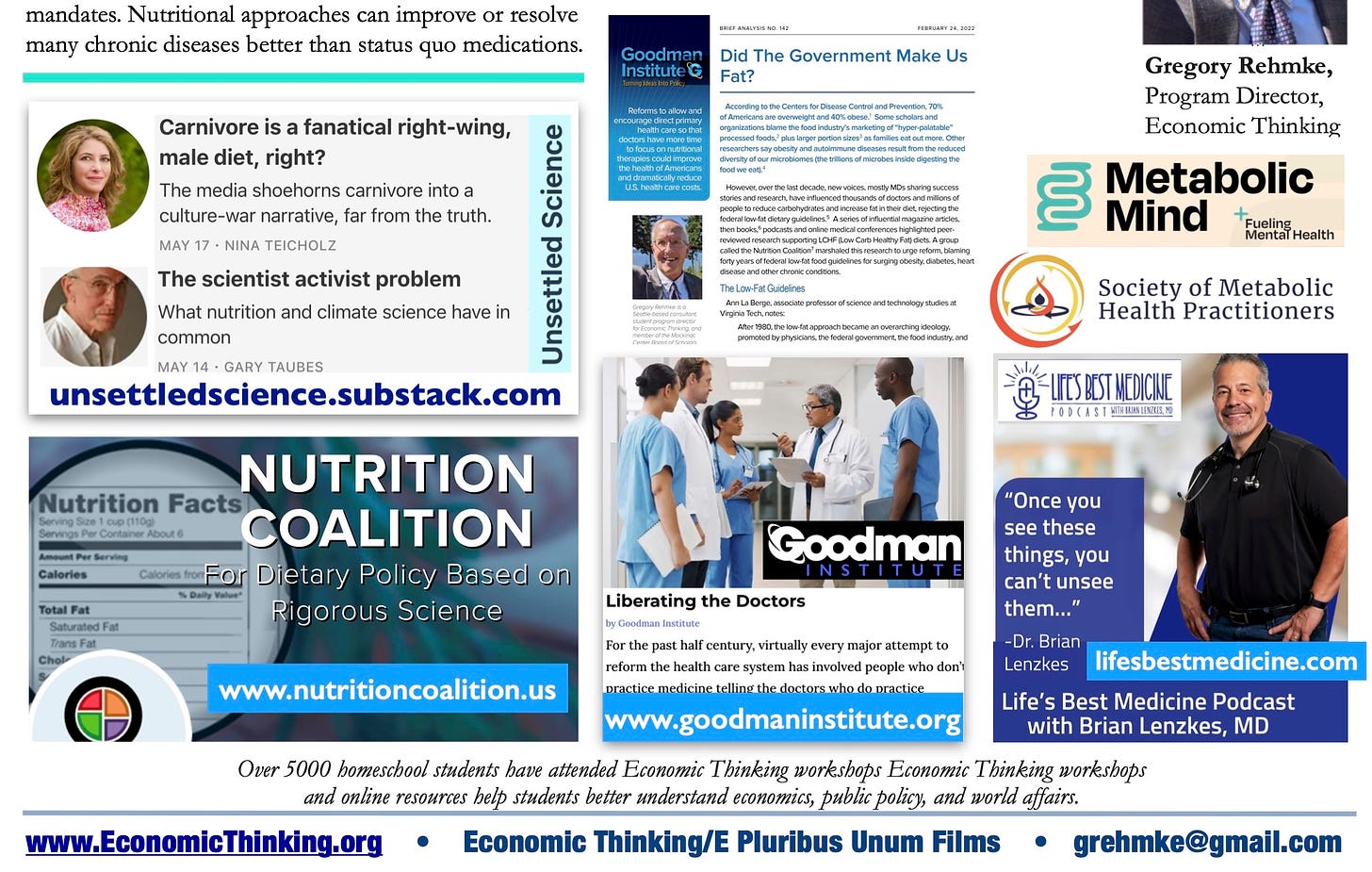Nutrition matters for the health of our body and mind. Exercise matters too. One of this year’s national debate topics calls for reforming federal health care policies. Research, discussion, and debate can play a key role in dramatically reducing both medical costs and chronic disease. I’ve also proposed the NSDA (pubic school) league debate reforming the federal dietary guidelines.
In May of 2020, I watched Nina Teicholz’s Big Fat Nutrition Policy talk at the Cato Institute, and many Low Carb Down Under videos from metabolic health conferences. What I learned influenced what I ate, reducing carbohydrates and increasing fat and protein. Some 50 pounds of visceral fat melted away.
By November 2020, I was 191 pounds instead of 231 (and waist size from 40 inches to 35).
The Goodman Institute published my brief Did the Government Make us Fat? in 2022. In recent years I’ve been giving “Nutrition Against Disease” presentations at conferences (APEE, Liberty International, Summer University). The story is of two distant metabolic gifts that today both challenge and bless us.
Overview Discussion
> Q1: Greg, what is metabolic health? I know you did a lot of research on that, but I am a newbie, so how would you define that in simple terms to a person who does not understand anything about it?
Metabolic health refers to how our body generates and processes energy. The food we consume provides the nutrients our body needs and our digestive system and microbiome process the food so its nutrients can be available to power our body, muscles, and brain. How much do we really need to know how all these systems work, and how macronutrients (fat, carbohydrates, and protein) and micronutrients (vitamins, minerals, etc.) are processed and used?
Why can’t we just eat intuitively, as some books (Anti-Diet and Intuitive Eating, for example) recommend? Well, there are reasons to be cautious. Food, drug, and weight-loss companies spend hundreds of millions advertising each year, trying to influence everyday people to “intuitively” buy or ask for their products.
Some knowledge about nutrition and health can help us recover or develop better intuitions and food habits. A 2018 University of North Carolina study found just 12% of Americans, one in eight, were metabolically healthy. Some combination of misguided dietary advice and misleading advertising seem to be driving the ongoing epidemic of obesity, diabetes, cardiovascular disease and other chronic health conditions.
Metabolically unhealthy people can suffer from a wide range of chronic conditions, from high blood pressure, obesity, type 2 diabetes, pre-diabetes, kidney disease, and even cancer at higher rates. A healthy metabolism keeps blood glucose levels fairly stable over time (though exercise and stress elevate them). Glucose surges and spikes bring insulin spikes to sequester the excess glucose, and over time lead to insulin resistance. Too much sugar and processed carbohydrates can spike glucose and insulin, but the debate continues on the benefits and costs of restricting carbohydrates or restricting fat, especially saturated fat, in the diet.
More discussion of the nuts and bolts of metabolism below…
> Q2: What is the relationship between exercise and metabolic health?
Given that the metabolic system converts the nutrient energy in food into energy powering our body and brain, it makes sense that exercise and nutrition are connected. Researchers can measure the metabolic benefits of exercise. When we get up to walk or stretch or lift weights, our heart rate increases to pump more blood to our muscles and we breathe more deeply so our lungs have more oxygen to absorb. We require more energy to exercise. So our resting metabolic rate ratchets up and more glucose is combined with oxygen in our mitochondria to produce ATP for our muscles to use for walking, stretching, running, or lifting.
Blood and oxygen circulating in the body to power muscles also brings more energy to the brain. That’s why it is hard to stay depressed when exercising. This Mayo Clinic article, “Depression and anxiety: Exercise eases symptoms,” explains:
Exercise helps prevent and improve a number of health problems, including high blood pressure, diabetes, and arthritis. Research on depression, anxiety and exercise shows that the psychological and physical benefits of exercise can also help improve mood and reduce anxiety. …
Some research shows that physical activity such as regular walking — not just formal exercise programs — may help improve mood. Physical activity and exercise are not the same thing, but both are beneficial to your health.
> Q3 What types of exercise are encouraged for improving metabolic health?
Well, we haven’t yet described the parameters of metabolic health. Our digestive system converts what we eat into what we need. The protein we eat is broken down into amino acids that are the building blocks of our body. Carbohydrates that we consume in bread, pasta, rice, fruit, and vegetables are converted to glucose, and they are used as energy or stored as glycogen in the liver or muscles, and when they are full, as fat in fat cells. Insulin is the hormone that allows glucose into muscle or fat cells. So the more we exercise the more glucose we metabolize and the more muscle mass we have, the more glucose we can store. Muscles serve as a “glucose sink” so that the excess carbohydrates people consume aren’t pushed into the liver as fat (causing fatty liver disease) or into adipose (or fat) cells, adding to either visceral (belly) fat or intramuscular fat or subcutaneous (under the skin) fat.
In earlier times it was a benefit to add a lot of fat in summer and fall to serve as a reserve through the long cold winters and sometimes cold springs. People without enough fat or enough stored food were less likely to survive.
So historically, the most important exercise was food gathering and storing for winter. Catching herring in the seas of northern Europe or sardines in the Mediterranean, processing olives into oil, and farming and providing feed for cows, pigs, chicken, and other animals helped provide the food for spring, summer, and fall, plus the food stores for winter.
Then the agricultural revolution and later the industrial revolution dramatically increased the food available, and at the same time machines gradually reduced the physical labor required for hunting, farming, fishing, and processing food like olives for the winter. Now in wealthy countries we mostly exercise by walking, stretching, bicycling, gardening, or mowing lawns, or from lifting weights or playing games like basketball, tennis, hiking, and skiing.
> Q4: Is there any time of the day when it is better to train so you can improve metabolic health?
I don’t know about this. They say the best exercise is the one you do regularly. If someone hates exercising first thing in the morning, it seems not a good idea to push them to try. Walking after meals has been a tradition, maybe helping digestion as well. People referred to a walk after meals as a morning or evening “constitutional.” On the benefits of walking after meals:
Walking [speeds] the digestion process, which can prevent problems like bloating and overeating. If you sit down or lie down right after having a heavy meal, you might notice stomach troubles like acid reflux and gas. Going for a light walk after a meal stimulates the metabolism and helps in burning calories (Why a 10-minute walk after eating meals is important, Times of India, (July 6, 2021).)
> Q5: As a conclusion what is the best tip you can give to the listeners? Any book recommendations or articles?
I started by watching videos, mostly presentations at medical conferences focusing on improving metabolic health. I had been gaining weight and having troubles like some gout and acid reflux. My father had long suffered from type 2 diabetes and I wondered if I was on that same path (just twenty-four years behind). In earlier Normal Nutrition posts I’ve recommended books, podcasts, websites, documentaries and nutrition research presentations at conferences.
Here is a list of organizations and videos I recommend:
• Low Carb USA - https://www.lowcarbusa.org/
• Low Carb Down Under on YouTube: https://www.youtube.com/user/lowcarbdownunder
• Society of Metabolic Health Practitioners - https://thesmhp.org/
• Nutrition Coalition - www.nutritioncoalition.us/
• LowCarbMD Podcast - https://lowcarbmd.com/
• Life’s Best Medicine - https://lifesbestmedicine.com/
• CrossFit Health - www.crossfithealth.com/
• Metabolic Mind - www.metabolicmind.org/




